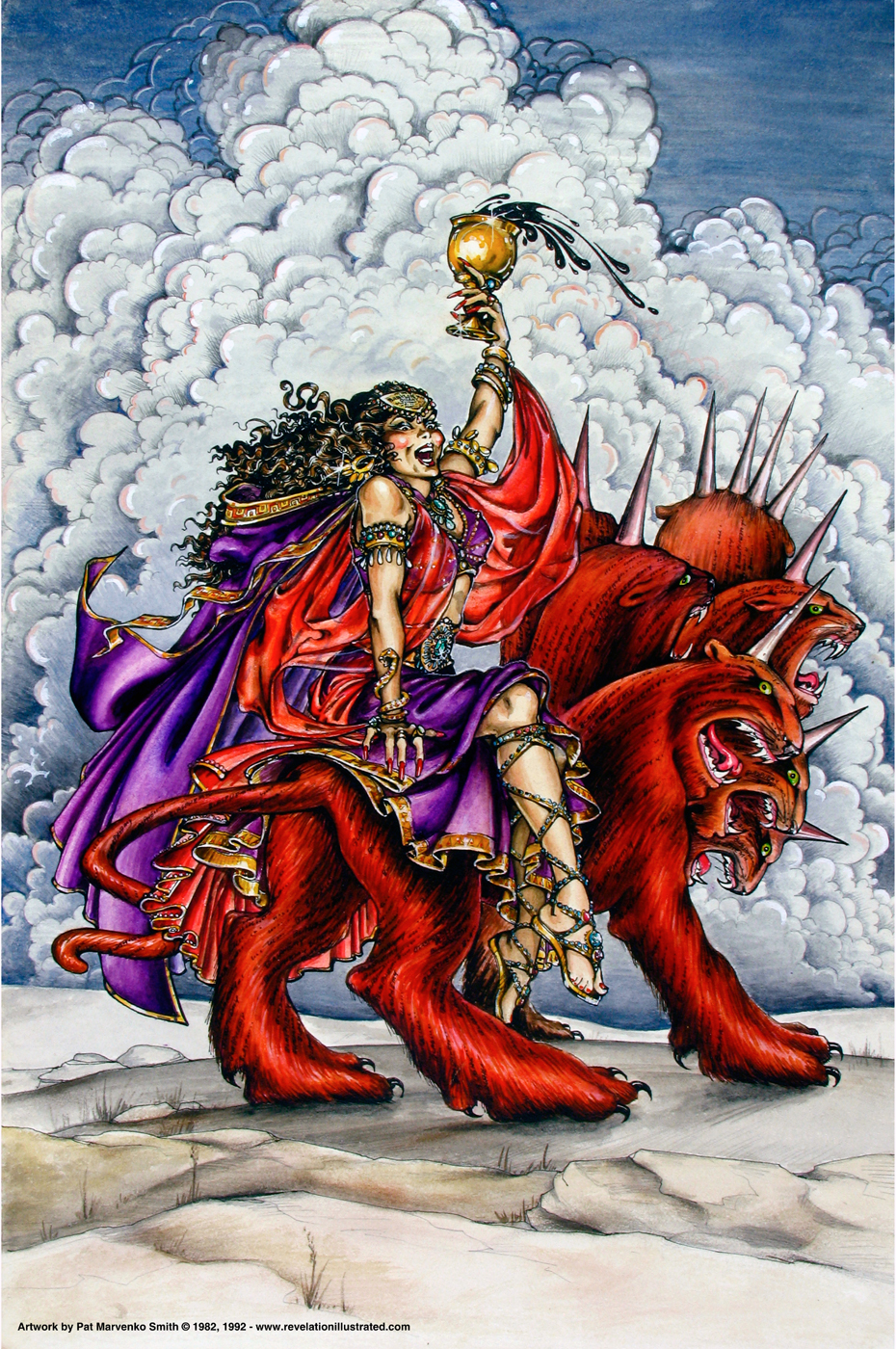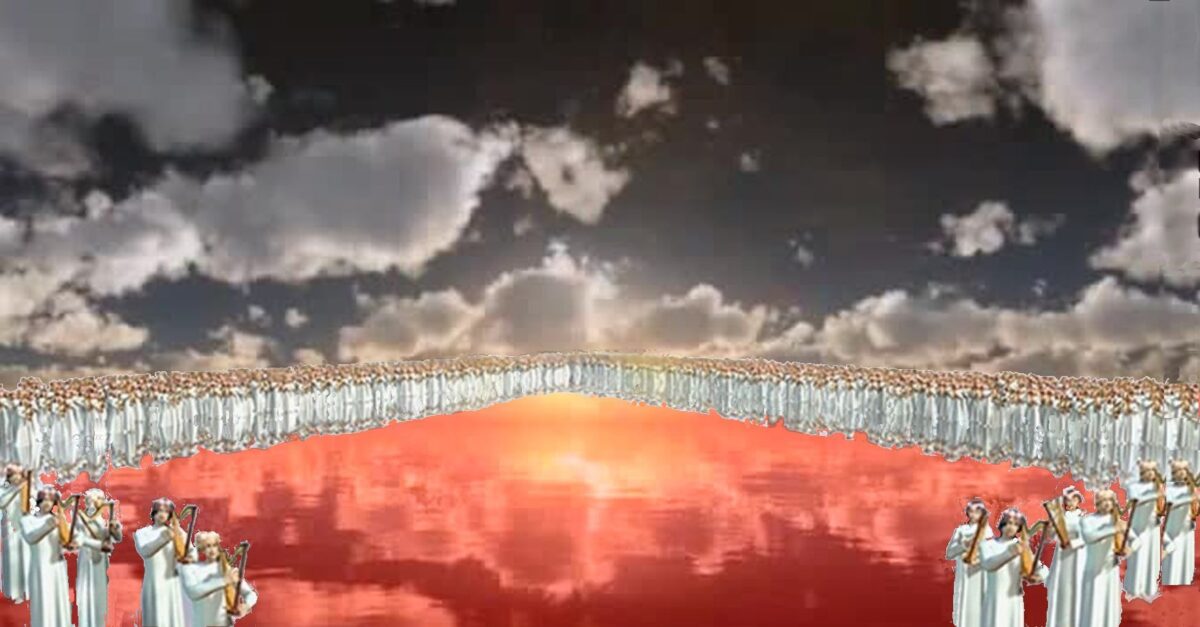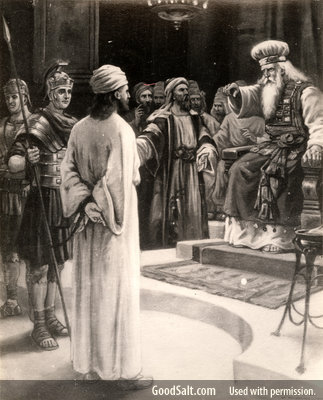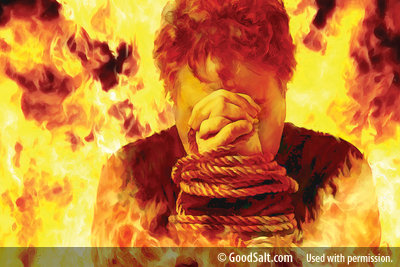“And another angel followed, saying, ‘Babylon is fallen, is fallen, that great city, because she has made all nations drink of the wine of the wrath of her fornication.’” Revelation 14:8
In another scene of John’s vision on earth (Revelation 14:6-13), the apostle hears four announcements that provide motivation to remain faithful to God and resist the beasts during the last half of the Tribulation period. God’s angels will make the first three announcements (14:6-12), and a voice from heaven will declare the fourth (14:13).
Last time we learned that the first angel proclaimed the everlasting gospel worldwide, calling unbelievers to “fear God and give glory to Him” because the reason for all the worldwide death and disaster during the last half of the Tribulation period is that “the hour of His judgment has come” (14:6-7). When people on the earth understand why all the calamities are taking place during the Tribulation, they may be more likely to believe in Jesus for His gift of everlasting life. 1
Next John records the second angel’s announcement: “And another angel followed, saying, ‘Babylon is fallen, is fallen, that great city, because she has made all nations drink of the wine of the wrath of her fornication.’” (Revelation 14:8). Much has been written about the identity of Babylon. Some believe it refers to the literal city of Babylon on the Euphrates River in modern Iraq that will be rebuilt in the last days. 2 But this is not possible because God said Babylon would become like Sodom and Gomorrah due to the conquest of the Medes (in 539 BC) and become an everlasting desolation never to be inhabited again (Isaiah 13:17-20; Jeremiah 25:11). 3
I understand “Babylon” in the book of Revelation to refer to the city of Rome (14:8; cf. 16:9; 17:1-18:21). That “Babylon” is to be taken symbolically is the use of the qualifying word “mystery” (Revelation 17:5). Compare this with Revelation 11:8 where Jerusalem is referred to as “the great city which spiritually is called Sodom and Egypt, where also our Lord was crucified.” Likewise, since the apostle Peter was writing from Rome, he refers to the city using the common code name “Babylon” in I Peter 5:13. 4
Since the apostle John wrote Revelation while a Roman prisoner on the island of Patmos, he could not make any derogatory remarks about Rome in his writings, so he used the name “Babylon,” emphasizing that it was a code name by referring to it as “Mystery Babylon” (Revelation 17:5). 5
That John had Rome in mind when he wrote about “Babylon” is his reference to it as the city of “seven mountains” or hills 6 (Revelation 17:9). In the context of the first century, this could only refer to Rome which was known as “the city of the seven hills.” 7 In Revelation 17:18, John refers to Babylon as “that great city which reigns over the kings of the earth.” In the first century context when John wrote the book of Revelation, this could only refer to the city of Rome which ruled the world at that time. 8
The doctrine and practice of ancient Babylon will be manifested in its final form in the city of Rome during the Tribulation period. The founder of Babylon (“Babel”) was Nimrod, the grandson of Ham who was the son of Noah (Genesis 10:1, 6, 8-10). You may recall that after Noah planted a vineyard and became drunk from the wine, he passed out naked “in his tent” (Genesis 9:20-21). His son, Ham, entered his father’s tent and “saw the nakedness of his father and told his two brothers outside” (9:22). Instead of Ham’s brothers gazing at the nakedness of their father as Ham had done, they covered their father’s nakedness without seeing him naked (9:23).
“Nakedness” in the beginning of the Old Testament was a shameful experience for fallen people (Genesis 3:7). To be seen unclothed outside of one’s marriage was both dishonoring and vulnerable. Ham seemed to look at his father’s nakedness with some kind of enjoyment and even announced it to his brothers instead of covering his father’s vulnerable condition. But Shem and Japheth hid the shame of their father’s nakedness much like God had covered the shame of Adam and Eve (Genesis 3:21). As a result of these two different responses, Noah pronounced a curse upon Ham’s son, “Canaan” (Genesis 9:25) because Ham was not ashamed of his father’s nakedness. But Noah blessed Shem and Japheth who, like Adam and Eve (3:7), sought to cover the shame of nakedness (9:26-27). The descendants of Ham, the Canaanites, became known for their shameless acts of sexual immorality which contributed to their eventual extinction.
Following in the footsteps of his grandfather’s unrighteousness, Nimrod persuaded his associates and followers to join together to “build ourselves a city, and a tower whose top is in the heavens; let us make a name for ourselves, lest we be scattered abroad over the face of the whole earth.” (Genesis 11:4; cf. 10:10). This was to be a rallying center for those who refused to obey God’s command to “fill the earth” (Genesis 1:28; 9:1). This movement was an imitation of what was real and true, for “they had brick for stone, and they had asphalt for mortar” (Genesis 11:3). This has ever since characterized Babylon in all the ages. It will never be more evident than during the Tribulation period when deception will be at its greatest.
God judged these people who were united by one language by dividing them into different languages so they would be “scattered … abroad from there over the face of all the earth” (Genesis 11:8-9) which is what the Lord originally commanded them to do (Genesis 1:28; 9:1). So, the city was called “Babel,” which means confused (Genesis 11:9a).
Walvoord writes, “Later the name was applied to the city of Babylon which itself has a long history dating back to as early as 3,000 years before Christ. One of its famous rulers was Hammurabi (1728-1686 B.C.). After a period of decline Babylon again rose to great heights under Nebuchadnezzar about 600 years before Christ. Nebuchadnezzar’s reign (605-562 B.C.) and the subsequent history of Babylon is the background of the Book of Daniel.
“Babylon was important not only politically but also religiously. Nimrod… had a wife known as Semiramis who founded the secret religious rites of the Babylonian mysteries, according to accounts outside the Bible. Semiramis had a son with an alleged miraculous conception who was given the name Tammuz and in effect was a false fulfillment of the promise of the seed of the woman given to Eve (Genesis 3:15).
“Various religious practices were observed in connection with this false Babylonian religion, including recognition of the mother and child as God and of creating an order of virgins who became religious prostitutes. Tammuz, according to tradition, was killed by a wild animal and then restored to life, a satanic anticipation and counterfeit of Christ’s resurrection. Scripture condemns this false religion repeatedly (Jeremiah 7:18; 44:17-19, 25; Ezekiel 8:14). The worship of Baal is related to the worship of Tammuz.
“After the Persians took over Babylon in 539 B.C., they discouraged the continuation of the mystery religions of Babylon. Subsequently the Babylonian cultists moved to Pergamum (or Pergamos) where one of the seven churches of Asia Minor was located (cf. Revelation 2:12-17). Crowns in the shape of a fish head were worn by the chief priests of the Babylonian cult to honor the fish god. The crowns bore the words ‘Keeper of the Bridge,’ symbolic of the ‘bridge’ between man and Satan. This handle was adopted by the Roman emperors, who used the Latin title Pontifex Maximus, which means ‘Major Keeper of the Bridge.’ And the same title was later used by the bishop of Rome. The pope today is often called the pontiff, which comes from pontifex. When the teachers of the Babylonian mystery religions later moved from Pergamum to Rome, they were influential in paganizing Christianity and were the source of many so-called religious rites which have crept into ritualistic churches. Babylon then is the symbol of apostasy and blasphemous substitution of idol-worship for the worship of God in Christ.” 9
In line with what Walvoord wrote about Nimrod’s wife, Semiramis, Pentecost quotes Ironside: “Semiramis… is reputed to have been the foundress of the Babylonian mysteries and the first high priestess of idolatry. Thus Babylon became the fountainhead of idolatry and the mother of every heathen and pagan system in the world. The mystery-religion that was there originated spread in various forms throughout the whole earth… and is with us today… and shall have its fullest development when the Holy Spirit has departed and the Babylon of the Apocalypse holds sway.
“Building on the primeval promise of the woman’s Seed who was to come, Semiramis bore a son whom she declared was miraculously conceived! And when she presented him to the people, he was hailed as the promised deliverer. This was Tammuz, whose worship Ezekiel protested against in the days of captivity. Thus was introduced the mystery of the mother and the child, a form of idolatry that is older than any other known to man. The rites of this worship were secret. Only the initiated were permitted to know its mysteries. It was Satan’s effort to delude mankind with an imitation so like the truth of God that they would not know the true Seed of the woman when He came in the fullness of time…
“From Babylon this mystery-religion spread to all the surrounding nations… Everywhere the symbols were the same, and everywhere the cult of the mother and the child became the popular system; their worship was celebrated with the most disgusting and immoral practices. The image of the queen of heaven with the babe in her arms was seen everywhere, though the names might differ as languages differed. It became the mystery-religion of Phoenicia, and by the Phoenicians was carried to the ends of the earth. Astoreth and Tammuz, the mother and child of these hardy adventurers, became Isis and Horus in Egypt, Aphrodite and Eros in Greece, Venus and Cupid in Italy, and bore many other names in more distant places. Within 1000 years Babylonianism had become the religion of the world, which had rejected Divine revelation.
“Linked with this central mystery were countless lesser mysteries… Among these were the doctrines of purgatorial purification after death, salvation by countless sacraments such as priestly absolution, sprinkling with holy water, the offering of round cakes to the queen of heaven as mentioned in the book of Jeremiah, dedication of virgins to the gods, which was literally sanctified prostitution, weeping for Tammuz for a period of 40 days, prior to the great festival of Istar, who was said to have received her son back from the dead; for it was taught that Tammuz was slain by a wild boar and afterwards brought back to life. To him the egg was sacred, as depicting the mystery of his resurrection, even as the evergreen was his chosen symbol and was set up in honor of his birth at the winter solstice, when a boar’s head was eaten in memory of his conflict and a yule-log burned with many mysterious observances. The sign of the cross was sacred to Tammuz, as symbolizing the life-giving principle and as the first letter of his name. It is represented upon vast numbers of the most ancient altars and temples, and did not, as many have supposed, originate with Christianity.
“From this mystery-religion, the patriarch Abraham was separated by divine call; and with this same evil cult the nation that sprang from him was in constant conflict, until under Jezebel, a Phoenician princess, it was grafted onto what was left of the religion of Israel in the northern kingdom in the day of Ahab, and was the cause of their captivity at last. Judah was polluted by it, for Baal-worship was but the Canaanitish form of the Babylonian mysteries, and only by being sent into captivity to Babylon itself did Judah become cured of her fondness for idolatry. Baal was the Sun-God, the Life-giving One, identical with Tammuz.
“…though Babylon as a city had long been but a memory, her mysteries had not died with her. When the city and temples were destroyed, the high priest fled with a company of initiates and their sacred vessels and images to Pergamos, where the symbol of the serpent was set up as the emblem of the hidden wisdom. From there, they afterwards crossed the sea and emigrated to Italy… There the ancient cult was propagated under the name of the Etruscan Mysteries, and eventually Rome became the headquarters of Babylonianism. The chief priests wore mitres shaped like the head of a fish, in honor of Dagon, the fish-god, the Lord of life – another form of the Tammuz mystery, as developed among Israel’s old enemies, the Philistines. The chief priest when established in Rome took the title Pontifex Maximus, and this was imprinted on his mitre. When Julius Caesar (who, like all young Romans of good family, was an initiate) had become the head of the State, he was elected Pontifex Maximum, and this title was held henceforth by all the Roman emperors down to Constantine the Great, who was, at one and the same time, head of the church and high priest of the heathen! The title afterwards conferred upon the bishops of Rome, and is borne by the pope today, who is thus declared to be, not the successor of the fisherman-apostle Peter, but the direct successor of the high priest of the Babylonian mysteries, and the servant of the fish-god Dagon, for whom he wears, like his idolatrous predecessors, the fisherman’s ring.
“During the early centuries of the church’s history, the mystery of iniquity had wrought with such astounding effect, and Babylonian practices and teachings had been so largely absorbed by that which bore the name of the church of Christ, that the truth of the Holy Scriptures on many points had been wholly obscured, while idolatrous practices had been foisted upon the people as Christian sacraments, and heathen philosophies took the place of gospel instruction. Thus was developed that amazing system which for a thousand years dominated Europe and trafficked in the bodies and souls of men, until the great Reformation of the 16th century brought in a measure of deliverance.” 10
In Revelation 14:8 the second angel announces that “Babylon the great,” the city of Rome (17:1-9), “is fallen” or “judged by God” because “she has made all nations drink of the wine of the wrath of her fornication.” The angel depicts “Babylon” as a temptress who gives “wine” to a man (“all nations”) to seduce him to commit “fornication” or spiritual adultery against the true God who will punish them with His “wrath.”
For centuries, pagan and papal Rome has seduced people away from the true God with her rituals and superstitions, and has persecuted those who proclaim the truth exposing her materialistic and idolatrous false religion (cf. Revelation 18:24). A detailed description of her upcoming judgment will be given in Revelation 17-18, but prior to that, God wants everyone to understand that her doom is certain.
Regardless of what you think the identity of “Babylon” is in the book of Revelation, one thing is certain – Jesus Christ will be triumphant in the end! Those of us who believe in Christ will be able to share in His victory.
Prayer: Lord Jesus, we look to You for life everlasting, not to religion which fails to deliver any lasting satisfaction. Instead of entrusting us with rituals or superstitions to spread around the world, You have entrusted us with the gospel of grace which freely offers eternal life to those who believe in Christ alone. Thank You for calling our attention to the upcoming destruction of Babylon, a materialistic and idolatrous false religion that has ancient roots and dangerous practices. Please open the eyes of those who embrace her deceptions so they may find peace with the true God through faith in God the Son, Jesus Christ. In Jesus’ mighty name, we pray. Amen.
ENDNOTES:
1. Bob Vacendak; Robert Wilkin; J. Bond; Gary Derickson; Brad Doskocil; Zane Hodges; Dwight Hunt; Shawn Leach, The Grace New Testament Commentary: Revised Edition (Grace Evangelical Society, Kindle Edition, 2019), pg. 1551.
2. Mark Hitchcock, The End: A Complete Overview of Bible Prophecy and the End of Days (Carol Stream, IL: Tyndale House Publishers, Inc., 2012 Kindle Edition), pp. 362-366; Charles H. Dyer, The Rise of Babylon: Sign of the End Times (Carol Stream, IL: Tyndale, 1991), pg. 182; Henry M. Morris, Revelation Record: A Scientific and Devotional Commentary on the Prophetic Book of the End Times (Carol Stream, IL: Tyndale, 1983), pp. 348-349; J. Vernon McGee, Thru the Bible, Vol. 5 (Nashville: Thomas Nelson, 1983), 1, 039.
3. Dr. David R. Reagan’s article, “Mystery Babylon” at www.christinprophecy.org.
4. Gary Derickson; Robert Wilkin; J. Bond; Brad Doskocil; Zane Hodges; Dwight Hunt; Shawn Leach; Bob Vacendak, The Grace New Testament Commentary: Revised Edition (Grace Evangelical Society, Kindle Edition, 2019), pp. 1370, 1400; cf. Archibald Thomas Robertson, A. T. Robertson’s Word Pictures in the New Testament [with Bible and Strong’s Numbers Added!], 6 Volumes (E4 Group, 2014 Kindle Edition), Kindle Location 223503.
5. Reagan’s “Mystery Babylon.”
6. The Greek word for “mountains” is orē which can also mean “hills” – see Walter Bauer, A Greek-English Lexicon of the New Testament and Other Early Christian Literature: Third Edition (BDAG) revised and edited by Frederick William Danker (Chicago: University of Chicago Press, 2000 Kindle Edition), pg. 724.
7. Reagan’s “Mystery Babylon”; cf. Tony Evans, CSB Bibles by Holman, The Tony Evans Study Commentary (B & H Publishing Group, Kindle Edition 2019), pg. 2410.
8. Reagan’s “Mystery Babylon”; Vacendak, pg. 1568.
9. John F. Walvoord, The Bible Knowledge Commentary Epistles and Prophecy, Editors John F. Walvoord and Roy B. Zuck (David C. Cook, 2018 Kindle Edition), locations 6075 to 6097.
10. J. Dwight Pentecost, Things to Come (Zondervan Academic, 2010 Kindle Edition), pp. 358-360 cites Harry A. Ironside, Lectures on the Revelation (New York: Loizeaux Brothers, [n.d.], pp. 287-295.






